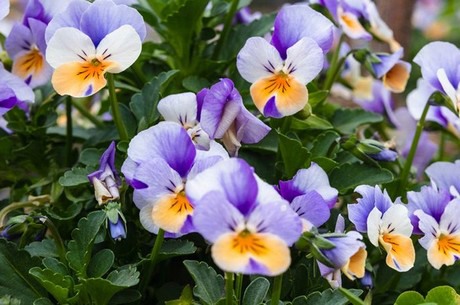Easter weekend can be the busiest holiday for gardeners. From durable geraniums to bee-attracting cosmos, we love getting in our summer colour – 252 million pots and trays of them every year to be precise.
It is also the weekend when the UK’s peat sales rocket. Despite 20 years of awareness-raising by conservation charities, BBC Gardeners’ World hosts and more peat-free choices than ever before from all the major garden retailers, peat sales stand at three billion litres every year and are rising…
Peat grows at a rate of 1mm a year… the good news is that none of UK's favourites need it. From 1 to 10, these are Marigolds, Geraniums, Begonias, Busy Lizzies, Lobelia, Petunias, Violas & Pansies, Antirrhinum/Snapdragons, Cosmos, and Tomatoes.
 Pansies © Denis Lesak
Pansies © Denis Lesak
Peat takes millennia to grow - commercial extraction can remove over 500 years ‘worth of growth’ in a single year. To bring peat to market, wildlife-rich wildernesses are stripped of vegetation and then wrapped in plastic. Birds like golden plover and butterflies such as the chequered skipper rely on healthy peatland habitats. In addition, cotton grasses, cuckooflower, marsh violet and sundews support species such as butterflies, dragonflies, snipe, curlews and skylarks.
Dr Trevor Dines explains: “A well-stocked display of summer garden plants and vegetables is a delight, providing instant colour and food for insects, to last the season long. But in using peat as compost for these plants, we are quite literally ‘costing the earth’. The good news is that our top 10 favourites will enjoy peat-free compost, which is readily available at garden centres – it’s just as effective and competitively priced. Most importantly, it has ZERO impact on the environment. And don’t just take our word for it - the National Trust has been peat-free for years and RHS gardens are 97% peat-free. Government is committed to phasing out peat use for gardeners; Be ahead of the curve and join us in urging friends and relatives to go #peatfreenow.”
Plantlife’s Ben McCarthy, chair of the peat partnership said “In the fight against climate change, the peatlands of the British Isles are one of our greatest assets: we cannot underestimate their importance for carbon capture. In the UK they hold more carbon than forests, but the extraction of peat destroys this carbon-rich habitat and results in significant carbon emissions and the lost potential of carbon sequestration. Advances in alternative growing media mean that peat can be left in the ground. Governments across the UK need to act immediately to end the use of peat for horticulture and other commercial purposes”.
Plantlife is working with key gardening organisations including the Royal Horticulture Society and the National Trust as well as the RSPB, Wildlife Trusts and Friends of the Earth, to engage government and the horticultural trade since 2017, to push for greater action to halt the use of peat in horticulture and ensure that internationally important peatlands are protected and restored.
source: Plantlife
